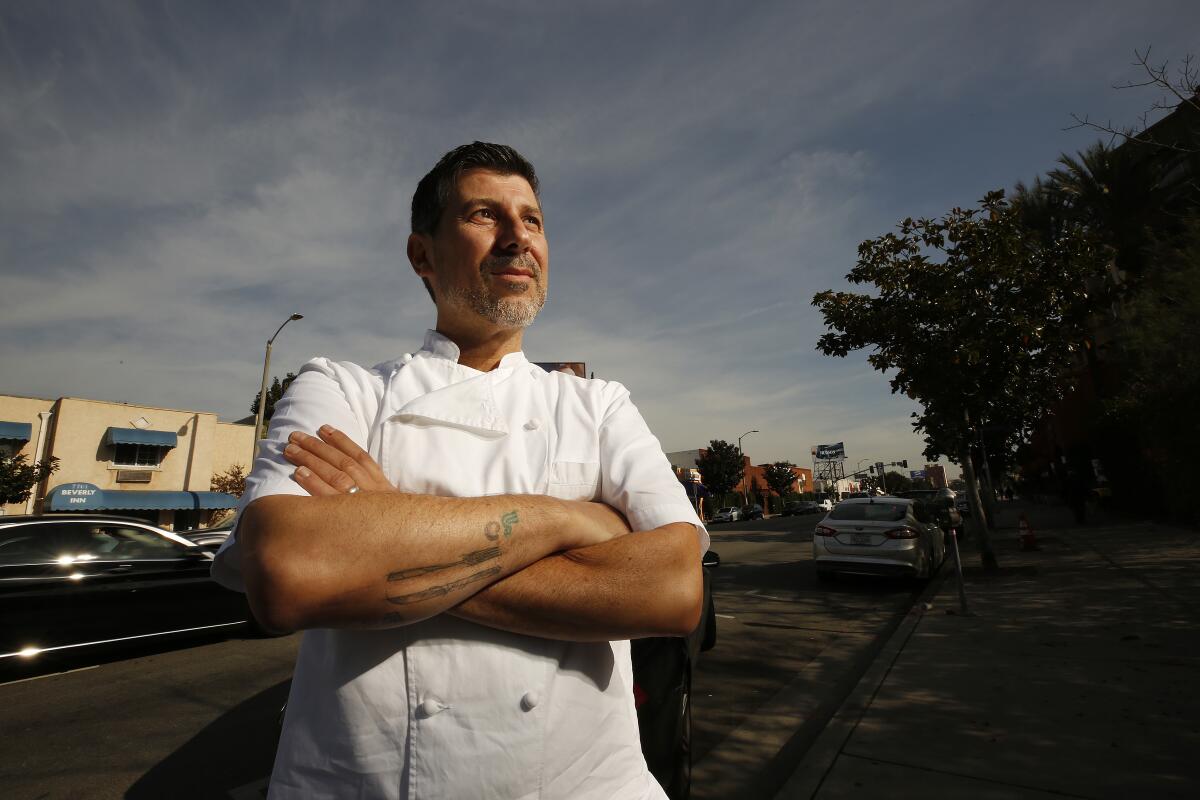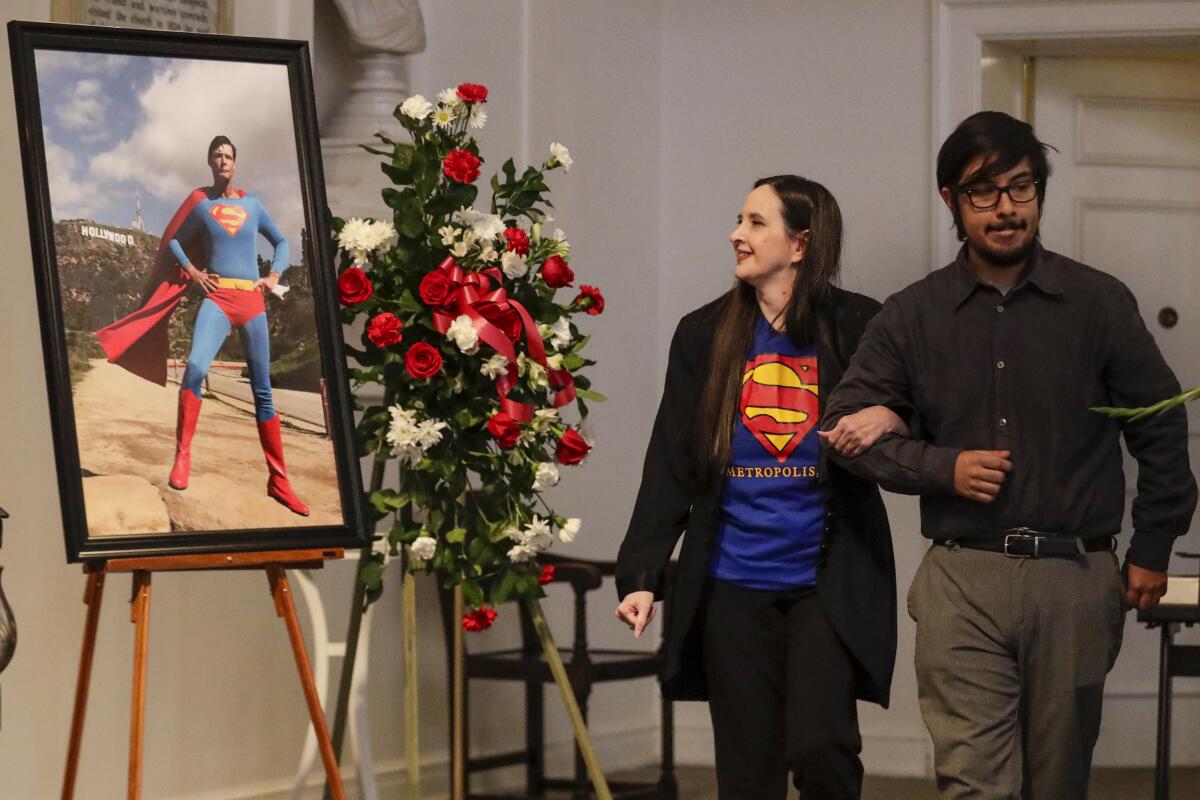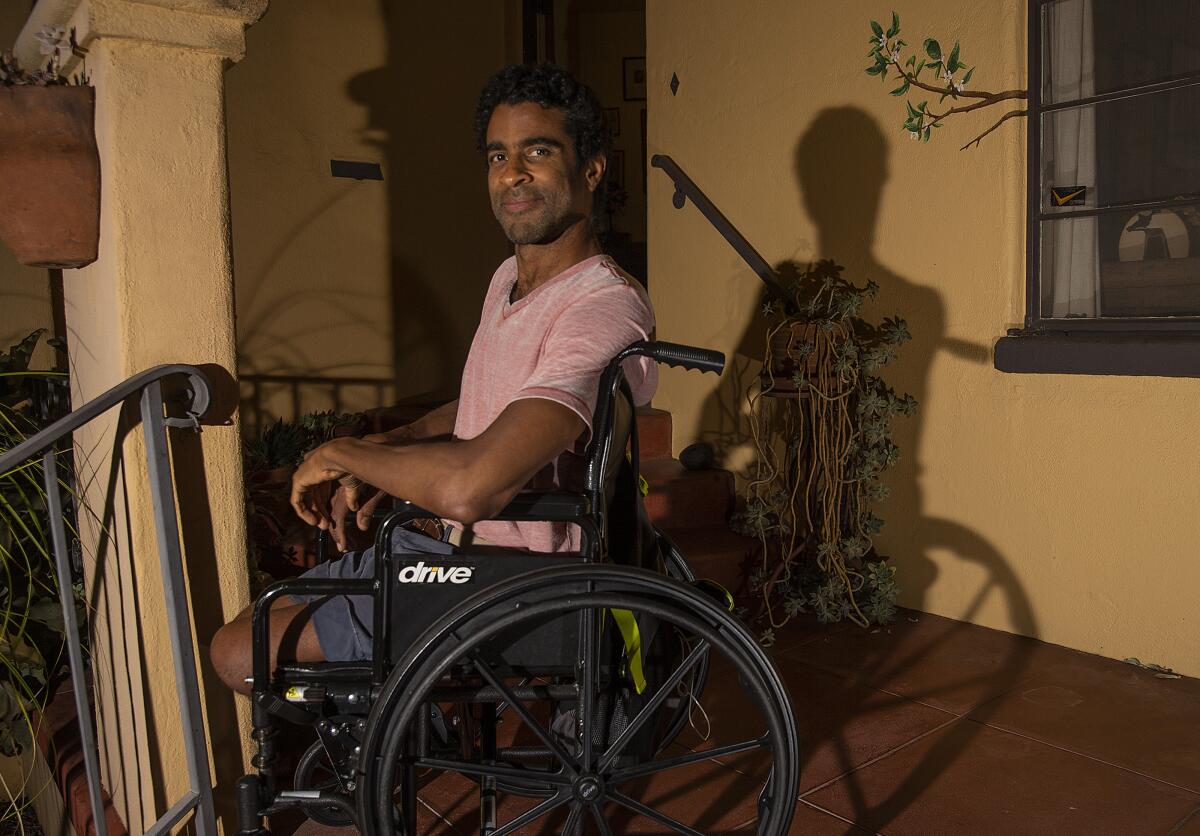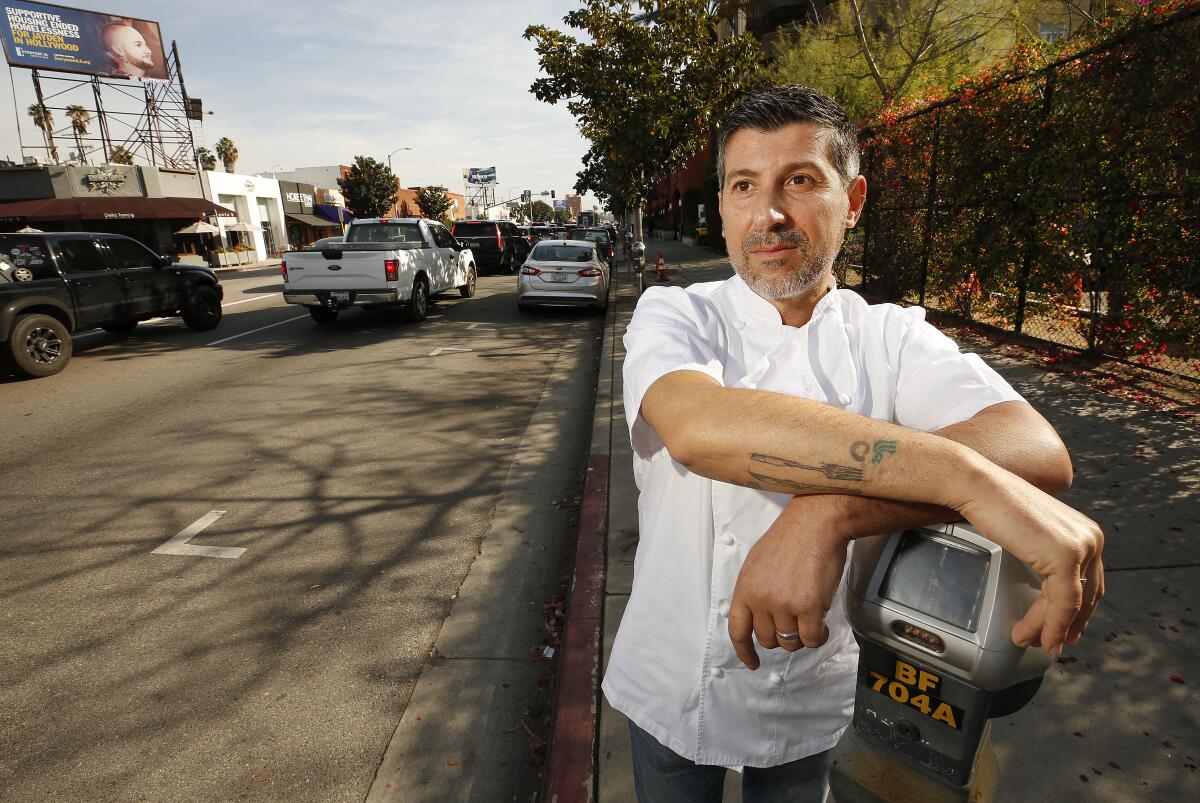He was lying at the curb. Blood was everywhere. A stranger stopped to help Obi Ndefo

- Share via
Alberto Lazzarino was driving east on Beverly Boulevard. It was late at night. The stretch of sidewalk he was passing was dark. At first, he wasn’t sure what he saw leaning against a curb. Maybe a homeless person or a makeshift shelter?
We get so used to seeing but not seeing grave need. It’s all around us in Los Angeles. It’s easier not to look.
But on this night, Lazzarino did not turn his eyes away. He focused them next on a car just beyond what was on the curb, its rear end so smashed that the contents of its trunk had exploded onto the street.
Something was wrong. He knew it. He just barely pulled over, didn’t turn his lights off, ran to the scene. Then it began to register: that shape on the curb was a man. The man I wrote about in last week’s column.
Lazzarino was the first responder after a hit-and-run driver slammed an SUV into Obi Ndefo, then reversed and took off. He didn’t see what happened. He simply saw a person barely alive, desperate for another person’s help.
One stranger had abandoned his victim. Another stranger had stepped in, determined to save him.
Even though he is a private chef, not a doctor or an EMT, even though he was still dressed in his white chef’s coat and there was so much blood everywhere, even though he was on his way home after a job that went late, bone tired and sweaty and beyond ready for a hot shower and bed, Lazzarino reached out to touch this stranger and hold him and comfort him and try to keep him alert and alive.
“Your life was more important than my own in those frantic moments ...,” he would later write in a letter he brought to Cedars-Sinai, begging that it be delivered to this person whose name he’d sounded out as “OB.” “For a moment I thought that I lost you, I didn’t want [that] to happen. Not in my arms, not that night, not like that, not for that reason.”
I often think about how strangers treat strangers in crisis — when they come to the rescue and when they don’t. I also think about those who have strong support nets and those in dire straits without them. These are themes that play in my mind with particular frequency this time of year, when many people are merry, surrounded by friends and family, while others feel more alone and lonely than ever.

Last week, I stood in the pouring rain, my boots sinking into the mud, with dozens of others who had come to L.A. County’s annual ceremony for its unclaimed dead to mourn strangers, some of whom we no doubt collectively had failed. I went to Forest Lawn Hollywood Hills to say goodbye to Christopher Dennis, the well-known Hollywood Boulevard Superman who had died away from those who recognized him, in the San Fernando Valley — a crystal meth addict, homeless, found dead caught in a clothing donation box.
I felt the weight of our disconnects so heavily that this story of connection between Alberto and Obi, and of a life that did not end in the darkness of a city sidewalk, sustained me.
It isn’t our newspaper’s regular style, by the way, but I like to use first names when I tell intimate stories. And somehow this one keeps getting more and more intimate — in surprising ways.
Obi is just Obi to me. He’s let me into his life so completely, I’m starting to know him very well. Obi and Alberto, who physically were in the same place only for a handful of minutes on the night of Aug. 17, also have become close. Even though they have yet to come face to face again, they send loving texts back and forth all the time. And Alberto, as it happens, is an old friend of mine, with whom I’d lost touch until Obi’s story unexpectedly brought us back together.
For those who didn’t read my last column, Obi is an actor who has been working on creating a TV show. He’s also taught yoga classes for years — and that night, he’d just finished one downtown. On his way home, he had stopped as he usually did to pick up his dinner at Erewhon Market. He was loading it into the cooler in the trunk of his parked car when the SUV pinned him — shearing off his right leg, leaving his left dangling by skin. A suspect who abandoned his badly damaged SUV in an intersection less than a mile away was arrested the next day but is out on bail and has yet to be charged.

Alberto must have arrived moments after the crash. Beverly Boulevard is a route he often takes to and from his home in Larchmont and his gigs in L.A.’s assorted hills. These days, though, he says, because of the memories, he avoids the stretch surrounding Erewhon after dark.
What did he discover when he reached Obi? Alberto crouched down and touched him and Obi’s skin was so cold. He held his hand and felt only a very slow pulse. Equally alarming: Obi wasn’t even bleeding anymore. On the street there was more blood than Alberto had ever seen in one place — even though he’s from a small town in northern Italy’s Piedmont region and knows how much comes out of cows at a slaughter.
Alberto remembers shouting for people to call 911. He remembers shouting to the owners of the Beverly Inn across the boulevard to bring blankets to warm Obi, which they did. He remembers shouting at one point at Obi himself — not to die on him. He remembers getting him to say his name and telling him he was going to be OK when Obi felt for his legs. He remembers being afraid to move him when Obi complained his back was hurting, and the great relief he felt when the ambulance arrived and he could put Obi in capable hands.
“I’m deeply sorry I couldn’t do better to make you more comfortable,” he wrote Obi, “but I was there the entire time. I didn’t let go of you.”
Alberto also remembers when his wife and son pulled up to the scene in separate cars after the ambulance had left — because they’d been taking the same route home from a party and saw his familiar white coat. He still wishes he could have shielded them because even the aftermath was rough.
No one in the family slept very well for days. They weren’t just worried about whether Obi would make it, they didn’t know if he was homeless or had anyone to help him. They were prepared to step in if he didn’t. Their lives already literally were connected by blood.
I was at Obi’s house one day last week when his mother handed me the beautiful letter from the chef who’d stayed by her son’s side. My eyes welled up and I felt a warm current run through my body when I read his first name and his mention of his wife’s name and Obi’s mother went to find his card and confirm his last name. And I also felt sadness that I hadn’t seen this man with this big heart for so long because people drift out of each other’s lives without meaning to and even good support nets sometimes need patching.
Both Alberto and Obi, by the way, insist they’re no braver than others. I think they are but somehow their strength makes me feel that I can be braver too.
“I wasn’t doing what a hero does,” Alberto has said of that night. “I was just doing what one human being should do for another.”

More to Read
Sign up for Essential California
The most important California stories and recommendations in your inbox every morning.
You may occasionally receive promotional content from the Los Angeles Times.











